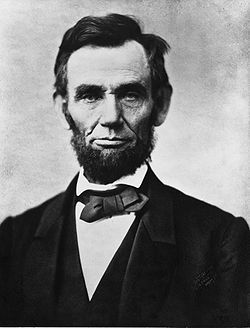This is your morning Open Thread. Pour your favorite beverage and review the past and comment on the future.
November 6 is the 310th day of the year (311th in leap years) in the Gregorian calendar. There are 55 days remaining until the end of the year.

On this day in 1860, Abraham Lincoln is elected the 16th President of the United States over a deeply divided Democratic Party, becoming the first Republican to win the presidency. Lincoln received only 40 percent of the popular vote but handily defeated the three other candidates: Southern Democrat John C. Breckinridge, Constitutional Union candidate John Bell, and Northern Democrat Stephen Douglas, a U.S. senator for Illinois.
Lincoln received 1,866,452 votes, Douglas 1,376,957 votes, Breckinridge 849,781 votes, and Bell 588,789 votes. The electoral vote was decisive: Lincoln had 180 and his opponents added together had only 123. Turnout was 82.2%, with Lincoln winning the free Northern states. Douglas won Missouri, and split New Jersey with Lincoln. Bell won Virginia, Tennessee, and Kentucky, and Breckinridge won the rest of the South. There were fusion tickets in which all of Lincoln’s opponents combined to form one ticket in New York, New Jersey, and Rhode Island, but even if the anti-Lincoln vote had been combined in every state, Lincoln still would have won a majority in the electoral college.
As Lincoln’s election became evident, secessionists made clear their intent to leave the Union. On December 20, 1860, South Carolina took the lead; by February 1, 1861, Florida, Mississippi, Alabama, Georgia, Louisiana, and Texas followed. The seven states soon declared themselves to be a sovereign nation, the Confederate States of America. The upper South (Delaware, Maryland, Virginia, North Carolina, Tennessee, Kentucky, Missouri, and Arkansas) listened to, but initially rejected, the secessionist appeal. President Buchanan and President-elect Lincoln refused to recognize the Confederacy. There were attempts at compromise, such as the Crittenden Compromise, which would have extended the Missouri Compromise line of 1820, and which some Republicans even supported. Lincoln rejected the idea, saying, “I will suffer death before I consent…to any concession or compromise which looks like buying the privilege to take possession of this government to which we have a constitutional right.”
Lincoln, however, did support the Corwin Amendment to the Constitution, which had passed in Congress and protected slavery in those states where it already existed. A few weeks before the war, he went so far as to pen a letter to every governor asking for their support in ratifying the Corwin Amendment as a means to avoid secession.

 On this day in 1922, British archaeologist Howard Carter and his workmen
On this day in 1922, British archaeologist Howard Carter and his workmen 
Recent Comments